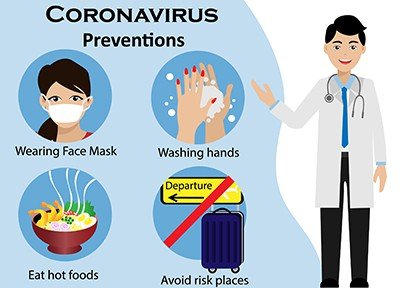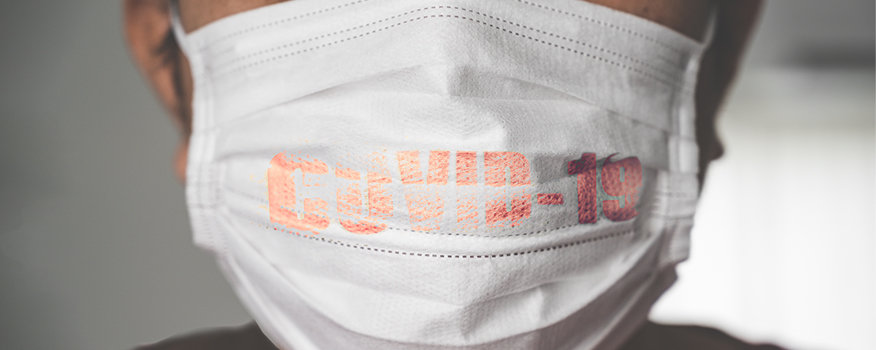Covid-19 Health Tips
The global pandemic known as the Coronavirus (COVID-19) has affected the way many of us go about our daily lives. Doctor Chai and staff at Back & Neck Clinic sincerely hope that you stay safe and healthy during this time. We suggest you take all the precautions suggested to you by the Center for Disease Control and Prevention (CDC) and other health care professionals. We are here to support you during this time.
An Important Message from Dr. Chai. If you have concerns about COVID-19, we are offering free phone consultations and will share with you what to look for and how to boost your immune system. Those with strong immune systems are less likely to contract the virus. A strong immune system also helps fight the virus should you come in contact with it. If you would like to talk with us - please call us at (918) 224-0546 to arrange your one-on-one phone consultation. We care for our patients greatly and would like to help you and your family during this difficult time. Let’s get you better prepared!
Coronavirus Symptoms
Typically, those who are infected will experience a number of flu-like symptoms, such as:
- Fever
- Tiredness
- Dry cough
- Difficulty Breathing
A small percentage of people who have this virus could carry it and not even know it (asymptomatic). Some may even be sick for one day to two weeks before experiencing symptoms.

How to Avoid Coronavirus
How can a virus as widespread as this be avoided? The World Health Organization (WHO) recommends various simple and practical methods of prevention. To name a few:
- Regularly and thoroughly wash your hands with soap and water
- Distance yourself from someone who coughs or sneezes and limit visitors (social distancing)
- Disinfect surfaces that are frequently touched daily
- Avoid touching your nose, mouth, and eyes
- Cover your mouth and nose with a bent elbow or tissue when coughing or sneezing
- Stay at home if you do not feel well
How to Disinfect the Virus from Hard Surfaces
- Wear disposable gloves, which should be thrown away after use.
- Surfaces should be cleaned using detergent or soap prior to disinfection
- For disinfection, dilute household bleach solution OR use alcohol *with 70% alcohol content. Most common EPA-registered household disinfectants should be effective.
Household Bleach Disinfectant Mixture:
Prepare a bleach solution by using the following mixture:
- 5 tablespoons (1/3 cup) bleach per gallon of water
- 4 teaspoons bleach per quart of water
** Never mix household bleach with ammonia or any other cleanser.
Although doctors do not yet know the best way to fight the Coronavirus, boosting the immune system is the most proactive thing you can start doing now to maintain your health and heighten your body’s natural defenses.

Boosting your immune system can be done by:
- Washing hands: Wash hands for 20 seconds with soap and water. If not available, use hand sanitizer that has greater than 60% alcohol in it.
- Avoiding habits of smoking: Tobacco smoke can change immune responses in the lungs and trigger inflammation and suppression on immune cells.
- Get proper sleep: Circadian rhythms help to regulate our immune system. This regulation helps with inflammation. To keep circadian rhythms in sync, maintain a sleep routine consistently. Adults should be getting at least 7-9 hours of sleep every night.
- Get the correct amount of exercise: Studies have shown that people who regularly exercise tend to have fewer cases of infections than in those who do not. Stay active, but avoid shared equipment - these surfaces tend to carry viruses. During this time, home workouts would be your safest option, and can also help you pass the time in a productive way while you are social distancing.
- Manage stress: Stress has shown to increase cortisol levels, which can negatively impact immune function. Try activities that decrease stress, such as deep breathing techniques, mindful exercises, and brisk walks.
- Drink in moderation: Studies have shown links between chronic heavy drinking and an increased susceptibility to infection. If you are drinking, try and limit consumption to 1-2 alcoholic beverages.
- Proper nutrition: Eating foods with high levels of vitamins and nutrients, especially vitamin C, D, and zinc, could help increase immune function. Be sure to include a rainbow of fruits and vegetables into your daily diet, and cut back on refined carbs and sugar.
The immune system is what its name suggests: a system that is made up of many biological structures and processes that protect against disease. It is tough to say that doing “one thing” or taking a particular supplement will protect you against the virus. By taking the precautions and treating your body well, you can encourage your body's natural defenses to heighten during this time.
Those with comorbid disease states can be affected more severely by the virus.
Comorbid means having 2 or more chronic diseases. An example is high blood pressure and diabetes. While we all need to take precautions and stay vigilant, 80% of those infected experience mild symptoms of the virus. The other 20% experience severe to critical symptoms.
Those with the following pre-existing conditions are at a higher risk of experiencing life-threatening symptoms:
- Cardiovascular disease
- Diabetes
- Chronic respiratory disease
- Abnormally high blood pressure
- Cancer
If you are one of these individuals, don’t panic, but take all precautions necessary to protect your health.
What If I Have the Coronavirus?
If you are experiencing symptoms of Coronavirus, or have tested positive, the CDC recommends:
- Staying home and calling a doctor
- Staying away from others so you do not spread the virus
- Frequent hand-washing and surface-cleaning
- Covering coughs and sneezes
- Monitoring symptoms
It’s also important to continue boosting the immune system to assist the body in reducing inflammation and ridding itself of the virus as quickly as possible.

What is Inflammation?
Inflammation is the body's natural response to injury and disease. It is a necessary response of the immune system. Throughout this page, you have been reading different techniques to reduce inflammation. Although a short-term inflammation response is a natural and healthy defense of the body, too much inflammation for too long can lead to various health conditions such as heart disease, stroke, and autoimmune disorders like rheumatoid arthritis and lupus.
If you have any of these health conditions or autoimmune disorders,
call us now for a free phone consultation to see how our medical staff can help you
(918) 224-0546.
How to Reduce Inflammation in the Body?
There are many methods to reduce inflammation in the body. Some of which are quitting unhealthy habits, like smoking, and creating good habits, like maintaining a respectable bedtime.
Another powerful tool is diet. A 2014 study followed 40 individuals who experienced symptoms of Inflammatory Bowel Disease (IBD.) A group of these individuals complied to an anti-inflammatory diet. Of the group that complied, the majority experienced a good or very good response to the diet. A percentage of the participants then continued with the diet and ultimately saw a reduction of their symptoms and were able to stop at least one of their IBD medications.
The key to improving the immune system is to start with healthy changes to your lifestyle and dietary habits. Essentially, an anti-inflammatory diet includes consuming lots of fruits and vegetables, whole grains, fish, nuts, beans, and fresh herbs, while avoiding processed and greasy foods. We have a healthy and effective anti-inflammatory diet plan that can deliver you the proper nutrients necessary for reduced inflammation and increased immune function.
Our trusted anti-inflammatory diet plan gives you all the tools necessary to begin your journey to a healthier lifestyle. It includes an easy-to-follow instruction manual, a recipe book, and vitamins and supplements to assist you on your path to wellness.
To learn more about how our effective anti-inflammatory diet plan can help you,
take advantage of our offer for a free phone consultation.
Call (918) 224-0546.

Looking to further reduce inflammation?
A recent article appeared in the news about the use of umbilical cells in the successful treatment of a woman in China who had the Coronavirus. Unfortunately, the US is behind the rest of the world in using these powerful cells.
However, those with advanced disease states who are looking to further reduce their body’s inflammation should consider this option.
Many who have the following conditions have experienced relief of their symptoms through umbilical cell treatments:
- Asthma
- Autoimmune diseases
- Coeliac disease
- Hepatitis
- Inflammatory bowel disease
These treatments utilize umbilical cord-derived mesenchymal cells to help the body's natural healing mechanisms repair and regenerate damaged tissues and reduce symptoms.
This is a non-surgical and non-pharmaceutical alternative to mainstream medicine. These cells are collected from the umbilical cord tissue of consenting mothers at the time of birth. The collection of this tissue does no harm to mother nor child. When introduced into the body, these cells “home” in on inflammation and travel to parts of the body that need repair. Although the United States is behind on using these treatments for chronic illnesses, our doctor offers a medical tourism package that will allow you access to this treatment in our beautiful, trusted facility in Colombia.
For more information about how our treatments in Colombia can help you, call our office today (918) 224-0546.
- Cigarette Smoking and Inflammation: Cellular and Molecular Mechanisms J Lee-V Taneja-R Vassallo
- 5 Things To Know About Sleep And Inflammation Michael Breus
- A Circadian Based Inflammatory Response – Implications For Respiratory Disease and Treatment
- The Right Exercise and Diet Can Reduce Chronic Inflammation Jennifer Jamack
- What Is Inflammation?
- An Anti-inflammatory Diet As Treatment For Inflammatory Bowel Disease: a Case Series Report
- Critically Ill Coronavirus Patient Saved By Stem Cells, Study Says
- Newman, LeRoux, & Danilkovitch-Miagkova. (2009). Treatment of Inflammatory Diseases with Mesenchymal Stem Cells . Inflammation & Allergy - Drug Targets, 8(2), 110–123

